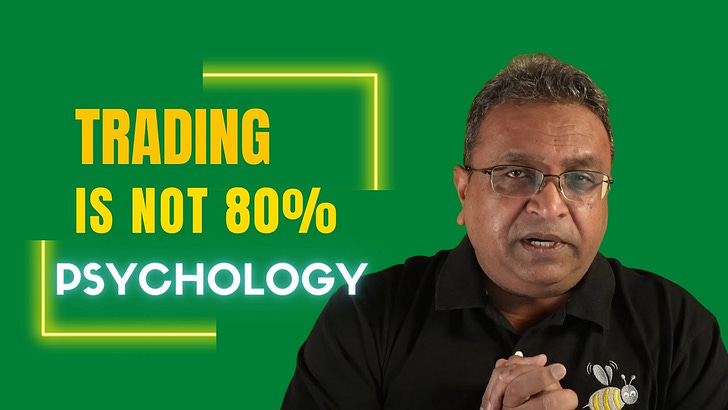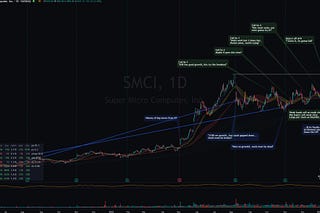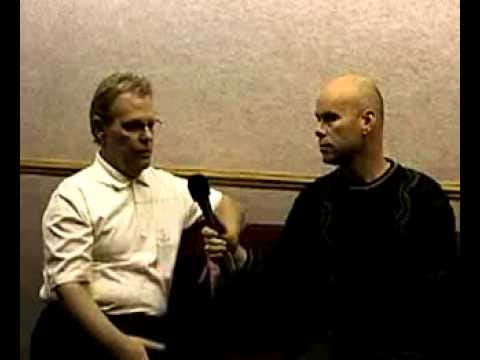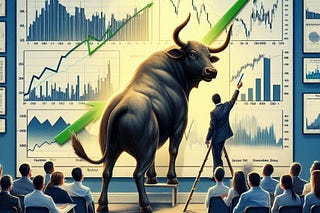Stockbee Notes: Trading Success Is Not 80% Psychology
Just master your setup and improve your self-efficacy
On Saturday, a Stockbee video on trading psychology caught my eye. I found it very interesting, so I decided to take notes — writing always helps me think.
As ever, my notes are not a substitute for watching the video yourself and taking your own notes — the below only reflects my key takeaways and musings.
Nevertheless, I hope you find them helpful.
Start with a profitable setup
People often say that trading is 80% psychology. Pradeep believes this to be misleading, especially to new traders. As he points out (00:08):
“If you do not have a setup which is profitable, how is psychology going to help you?”
If you’re struggling with, for example, entries or exits, those are functions of not having a good setup — or at least not properly understanding the setup you’re trading. Not a function of poor psychology.
That said, psychology is a factor in trading. It’s just not 80% of it.
It’s also something to only add to your trading after you have a good setup, and after you’ve got all the necessary rules and other elements in place to trade it well. Adding psychology at that stage can help you make more money.
But as a beginner trader, psychology isn’t the thing that will make you profitable. Instead, focus on finding a profitable setup and mastering it.
Linking to a Qullamaggie lesson
This reminds me of what Qullamaggie is constantly telling us during streams, and also of something he said in his Chat With Traders interview. I quote from my notes:
“Towards the end of the interview (1:06:40), Kristjan said that he felt a lot of people — even some fairly successful traders — would do even better if they really went back and looked at thousands of examples of the setup(s) they trade.
“As part of that process, they should really nail down all of their setup’s variations, as well as look at how the overall market was at the time of those setups.”
Sadly, I believe that far too few traders have actually done this. I certainly believe the number of traders who have done this to be significantly lower than the number of traders who ‘skipped ahead’ to study psychology rather than do a deep dive of their setup.
So, what kind of psychology actually adds value?
Going back to Pradeep’s video, he references Albert Bandura’s concept of ‘self-efficacy’. This is defined as:
“People’s judgments of their capabilities to organize and execute courses of action required to attain designated types of performances.”
There is a clear link to trading there. As Pradeep says (2:15):
“A trader who is successful has a very high self-efficacy belief about a particular setup.”
Basically — and I realise this sounds a bit cheesy — you need to believe in yourself.
Specifically, you must believe in your ability to perform — in this case, to trade your setup well.
A common vicious circle
Among traders, I often see a vicious circle when it comes to self-confidence. Traders tell themselves that they’ll become self-confident after becoming profitable.
That might sound reasonable. The trouble is, you can’t become profitable unless you are confident.
So how do you get that confidence? How do you build conviction?
By studying thousands of charts. By backtesting. By reviewing your numbers.
The exact nature of that studying will vary per person. But the fundamental point is the same: you have to put in some serious work, and specifically into the mechanical side of trading. If you don’t truly master your setup, you’re not ready to master your psychology.
The five sources for building self-efficacy
Going back to Pradeep’s video again, he highlights five sources for building self-efficacy, the first of which aligns closely to what I said above:
1. Mastery experiences
The first and most important mechanism for self-efficacy: spending time and effort to try to master a particular skill or field.
For example, if you want to learn to trade bottom bounces, you need to study at least 500 bottom bounces.
The more you study the thing that you want to learn, the better your understanding of that thing, and the more easily you’ll be able to identify it in real time.
As Pradeep points out (8:08):
“These kind of psychological techniques are going to work. Why? Because that is how all human behaviour is learnt, and that is how you develop confidence in your trading ability.”
The more you practice something, the more easily that thing will come to you.
That works both positively and negatively: the more you practice good writing, for example, the easier it’ll become. But the more you break your rules or discipline, the easier it’ll be to continue to break them going forward.
As Mark Minervini always says: practice doesn’t make perfect. Only perfect practice does.
2. Vicarious experiences
Vicariously watching someone else perform or do the skill that you’re trying to learn can also increase your self-efficacy. Essentially, it increases your belief that it can be done.
(Qullamaggie streams, anyone? Or books like the Market Wizards series by Jack Schwager?)
Pradeep offers Paul Tudor Jones as an example, who was trained by a very successful cotton exchange trader. The fact that he was able to see that success with his own eyes made him believe that he could be a successful trader too.
3. Social persuasion
Social persuasion — i.e. the type of people you surround yourself with — also has a significant impact on your self-efficacy beliefs.
This can work both ways: if you surround yourself with negative, bitter people (whether online or in real life) who don’t believe that you can do something, you may start believing them.
But if you surround yourself with optimistic people who are encouraging, that’ll have a positive effect on your self-efficacy. It makes you believe more strongly that you can do it.
I think this principle can also be applied more broadly: you’re the average of the five people you spend the most time with (or perhaps the five people you consume most content from).
So, choose those five well, and learn from their successes and mindset.
4. Visualisation
If you want to improve your self-efficacy, visualisation can be a very helpful technique — something confirmed by scientific studies. Basically, if you visualise a performance in your mind before you actually perform it, this can enhance your self-efficacy beliefs.
This one I’ve heard quite a lot, from many different traders: if you visualise all the different ways your trading day, or an individual trade, might go, you’ll find it easier to make the right decisions when the situation is actually happening.
5. Psychosomatic state
Quite simply: if you’re sick or otherwise distracted, this negatively impacts your self-efficacy.
Conclusion
As Pradeep explains, if you want to study psychology, study Bandura’s self-efficacy theory. Pradeep calls this “real” psychology, as opposed to the “gimmicky” kind, and I do take his point.
For example, read this Tom Dante thread. In it, Tom lays out his edge with a lot of clarity and confidence — a clear example of a high self-efficacy belief. And in itself, part of his edge.
As I said in Sunday’s post, I don’t often write about psychology. But when I do, I try to be practical. I believe Pradeep’s video meets that criterion.
More content like this
All my stacks relating to psychology are here. All my Stockbee stacks are here (currently just this post, but I’d like to write about Pradeep again in future).
The Trading Resource Hub’s full archive is available here.













Thank you ;)